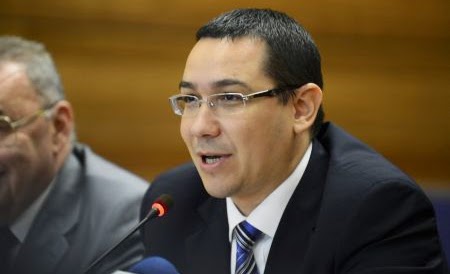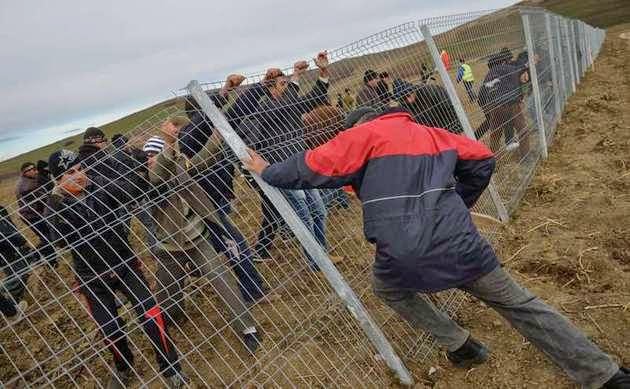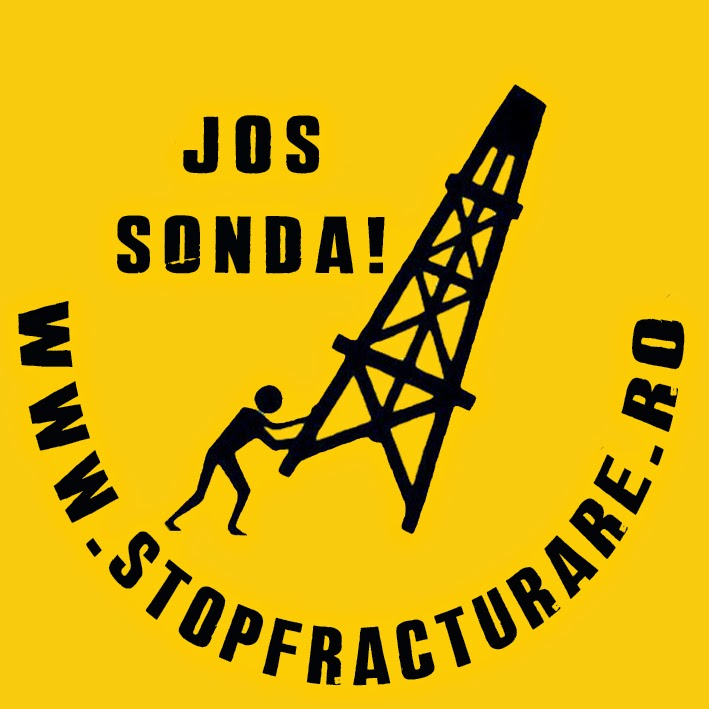Allegations have resurfaced that Anti-Fracking activists in Europe are on Russia’s payroll, according to a NY Times news article. That article focuses on the anti-fracking protest focused on Pungesti Romania, which I’ve covered in-depth last winter. The claim is that if the anti-frackers are successful in banning fracking, they’re doing Russia’s bidding by ensuring Europe will be dependent on Russia’s natural gas, and therefore the anti-frackers must be getting support from Russia.
A version of this idea surfaced last July when then-NATO Secretary General Anders Rasmussen claimed that Russia is using “sophisticated information and disinformation operations” to engage with environmental organizations and other anti-fracking organizations, to tilt the political climate in Europe against hydraulic fracturing, so that Europe would remain dependent on Russian natural gas.
At the time anti-fracking groups denied the allegation proudly saying they would never work for Russia. The leader of a Bulgarian group, Borislav Sandov, pointed out that years ago when his group opposed the South Stream project (that was to deliver Russian gas to Europe) it was accused his group was being paid by Obama and NATO. Now that his group is opposing fracking, they’re accused of being on Russia’s payroll. Perhaps these groups aren’t being paid by either side of the geopolitical tug-of-war and are, like me, honestly opposed to these things.
Romanian’s generally have little love for Russians, but instead a distrust. Life for Romania under the Soviet sphere of influence was bleak. Further, Romanian culture is decidedly not Slavik, the social identity proudly stems from the Roman Empire, and therefore Romanians don’t even have cultural affinity with Russia.
 |
| Pungesti villiager |
It begins by returning us to the small village of Pungesti Romania, deep in the Romanian portion of Moldova. (Russians took the other half of Moldova following WWII – coincidentally or not, Moldova is voting right now on parliamentary elections that will decide whether Moldova continues to move towards the European Union or to return to Russia’s embrace)
The Mayor, Vlasa Mircia, is back in Pungesti after having been run out of town during the protests. The locals believe he betrayed the village by making a possibly illegal land deal with Chevron. For his part Mircia expresses “shock” that they’d never had “protesters” in the area, but suddenly protesters were everywhere.
 |
| Romania PM Victor Ponta |
That sentiment is echo’d by national-level Politicians in Romania including Prime Minister Victor Ponta. To their eyes, the devil is Russia’s Gazprom, not America’s Chevron.
The NY Times piece says “Gazprom, a state-controlled energy giant, has a clear interest in preventing countries dependent on Russian natural gas from developing their own alternative supplies of energy, they say, preserving a lucrative market for itself — and a potent foreign policy tool for the Kremlin.”
Iulian Iancu, chairman of the Romanian Parliament’s industry committee, described by the NY Times as “a firm believer that Russia has had a hand in stirring opposition to shale gas exploration across Eastern Europe” is quoted as saying “It is crucial for Russia to keep this energy dependence. It is playing a dirty game.” Iancu doesn’t have proof for his allegation, however.
Romanian PM Victor Ponta is quoted saying “Energy is the most effective weapon today of the Russian Federation — much more effective than aircraft and tanks.”
I believe that these sentiments are true – that Russia wants to gain dominance over Russia through natural gas supplies. I’ve made
the same argument here on The Long Tail Pipe. But – does that mean Romanian anti-fracking groups are therefore on Russia’s payroll?
The proof offered by the NY Times article?
First is that Russia, led by former KGB agent Vladimir Putin, tends to use subterfuge and stealth against its neighbors. Take for example the annexation of Crimea, led by forces not wearing any insignia that rallied pro-Russia sentiment and kicked out the Ukrainian military. The same pattern is under-way in Eastern Ukraine. It’s alleged, without solid proof, that these insignia-less forces are Russians.
 |
Romanian anti-fracking protesters
tearing down the fence surrounding Chevron’s
drilling site in Pungesti |
Next is that Russia doesn’t exactly have a history of environmental awareness. Quite the opposite, the country has a history of environmental disasters. But when it comes to Fracking, Russians are “enthusiastically green” saying that Fracking has serious environmental problems. While I agree that Fracking has serious environmental problems, but Russia is probably taking an environmentalist stance for political expediency.
Next is a curious contrast between the vehement protests against Chevron’s fracking operation, but no protest against a fracking operation in far western Romania owned by Nis, a subsidiary of Gazprom. Strong protests against an American Fracker, but none against a Russian Fracker? Curious. The NY Times does say that “protest leaders” answer to this complaint is that anti-Chevron protests were because they were about to start exploratory drilling (which Chevron eventually did), while Nis is only doing “geological survey work” ahead of any decision to drill.
The last is attributed to Anca-Maria Cernea, a leader of a conservative political group in Bucharest. While she has no proof, she’s sure that the Russians are behind the protests. She does note the activist groups working against Fracking generally don’t work together, but united on this issue. Some of the groups do have ties to “the heavily Russian influenced security apparatus in neighboring Moldova,” according to Ms. Cernea. Also, Russian news media (especially RT News) were very active in covering the protests.
While RT was no-doubt airing lots of Pungesti coverage – that channel is heavily slanted to airing anything that makes The West look bad – I saw much more coverage from Epoch Times, a news outlet that’s not connected to Russia (so far as I know) because it originated from protests of China’s treatment of Falun Gong.
Just because Russia and I and the anti-frackers all agree that Fracking is a bad idea, doesn’t mean that I or the anti-frackers are on Russia’s payroll. But that’s the thrust of the NY Times article.
All the “proof” offered by the NY Times is circumstantial and without documentation, and rests on this flawed reasoning – that just because I and the anti-frackers are against fracking we’re on Russia’s payroll.
Instead – when Russia says fracking is a bad idea, it’s not for environmental reasons, but for geopolitical reasons. But I, and the anti-frackers I’m aware of, say fracking is an environmentally bad thing to do on many levels.
About David Herron
David Herron is a writer and software engineer living in Silicon Valley. He primarily writes about electric vehicles, clean energy systems, climate change, peak oil and related issues. When not writing he indulges in software projects and is sometimes employed as a software engineer. David has written for sites like PlugInCars and TorqueNews, and worked for companies like Sun Microsystems and Yahoo.- Highway design could decrease death and injury risk, if “we” chose smarter designs - March 28, 2015
- GM really did trademark “range anxiety”, only later to abandon that mark - March 25, 2015
- US Government releases new regulations on hydraulic fracturing, that some call “toothless” - March 20, 2015
- Tesla Motors magic pill to solve range anxiety doesn’t quite instill range confidence - March 19, 2015
- Update on Galena IL oil train – 21 cars involved, which were the supposedly safer CP1232 design - March 7, 2015
- Another oil bomb train – why are they shipping crude oil by train? – Symptoms of fossil fuel addiction - March 6, 2015
- Chevron relinquishes fracking in Romania, as part of broader pull-out from Eastern European fracking operations - February 22, 2015
- Answer anti- electric car articles with truth and pride – truth outshines all distortions - February 19, 2015
- Apple taking big risk on developing a car? Please, Apple, don’t go there! - February 16, 2015
- Toyota, Nissan, Honda working on Japanese fuel cell infrastructure for Japanese government - February 12, 2015
About David Herron
David Herron is a writer and software engineer living in Silicon Valley. He primarily writes about electric vehicles, clean energy systems, climate change, peak oil and related issues. When not writing he indulges in software projects and is sometimes employed as a software engineer. David has written for sites like PlugInCars and TorqueNews, and worked for companies like Sun Microsystems and Yahoo.
















